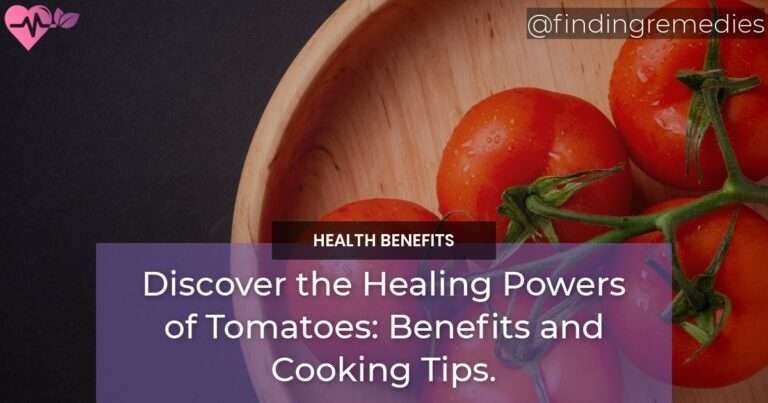Tomatoes are one of the most commonly consumed vegetables worldwide. They are a rich source of nutrients, natural compounds, and antioxidants that offer numerous health benefits.
In this article, we will delve into the health benefits of tomatoes and everything you need to know about them.
Table of Contents
Overview of Tomatoes
Tomatoes are a fruit, although they are commonly referred to as a vegetable. They are native to South America and have been cultivated for centuries. Today, they are grown worldwide and are a staple in many cuisines. Tomatoes come in various sizes, colors, and shapes, including cherry, beefsteak, and roma tomatoes.
Nutrition Profile of Tomatoes
Tomatoes are a nutrient-dense food that provides a range of vitamins and minerals. Here are some of the macro and micronutrients found in tomatoes:
Macro and Micro Nutrients in Tomatoes
- Vitamin C
- Vitamin K1
- Vitamin A
- Potassium
- Dietary Fiber
- Folate
- Thiamin
- Niacin
- Vitamin B6
- Magnesium
- Copper
Calories in Tomatoes
One medium-sized tomato contains approximately 22 calories, which makes it a low-calorie food.
Natural Compounds in Tomatoes
Tomatoes contain a variety of natural compounds that offer additional health benefits. Here are some of the most notable ones:
Lycopene
Lycopene is a potent antioxidant found in tomatoes. It gives them their red color and has been linked to numerous health benefits, including reducing the risk of heart disease, certain types of cancer, and protecting the skin from damage caused by UV rays.
Beta-Carotene
Beta-carotene is another antioxidant found in tomatoes. It is converted into vitamin A in the body and is essential for vision health, immune system function, and cellular growth and development.
Vitamin C
Tomatoes are an excellent source of vitamin C, a powerful antioxidant that helps protect the body against free radicals and promotes wound healing, skin health, and immune system function.
Health Benefits of Tomatoes
Here are some of the most significant health benefits of eating tomatoes:
Cardiovascular Health
Tomatoes contain several nutrients, such as potassium, dietary fiber, and vitamin C, that are essential for heart health. They have been linked to reducing high blood pressure, lowering cholesterol, and decreasing the risk of heart disease.
Skin Health
The lycopene in tomatoes protects the skin from UV damage, which can cause premature aging and skin cancer. Tomatoes also contain vitamin C, which promotes collagen production and helps keep the skin looking youthful and healthy.
Bone Health
Tomatoes are a good source of vitamin K, which is essential for bone health. It helps the body absorb calcium, which is necessary for building and maintaining strong bones.
Effects of Cooking on Tomatoes
Cooking tomatoes can affect their nutrient content and natural compounds. Here are some things to keep in mind:
Nutrient Retention
Cooking tomatoes can increase the bioavailability of some nutrients, such as lycopene.
Changes to Natural Compounds
Cooking tomatoes, especially for long periods at high temperatures, can reduce the levels of some natural compounds, such as vitamin C.
Proper Storage of Tomatoes
To get the most out of your tomatoes, it’s essential to store them properly. Here are some tips:
Best Storage Conditions
Tomatoes should be stored at room temperature away from direct sunlight. They should not be refrigerated until they are ripe.
Shelf Life
Tomatoes can last for up to two weeks if stored properly. They should be checked regularly for signs of spoilage.
Risk Factors
While tomatoes offer numerous health benefits, there are some risk factors to keep in mind.
Allergic Reactions
Some people may be allergic to tomatoes. Symptoms can include itching, redness, and swelling.
Interactions with Medications
Tomatoes contain salicylates, which can interfere with blood thinners and other medications. If you are taking any medication, it’s essential to talk to your doctor before consuming tomatoes.
Tomatoes as a Healing Food
Tomatoes are a healing food that offers a range of health benefits. Here are some of the most significant:
Anti-Inflammatory Properties
The natural compounds in tomatoes, such as lycopene, have anti-inflammatory properties that can help reduce inflammation in the body, which is linked to numerous chronic diseases.
Reducing Cancer Risk
Tomatoes contain several natural compounds, such as lycopene and beta-carotene, that have been shown to reduce the risk of certain types of cancer, including prostate, lung, and stomach cancer.
Types and Varieties of Tomatoes
Tomatoes come in various types and varieties, each with its unique taste and texture. Here are three common types:
Cherry Tomatoes
Cherry tomatoes are small, round, and sweet. They are perfect for snacking, salads, and roasting.
Beefsteak Tomatoes
Beefsteak tomatoes are large, meaty, and juicy. They are perfect for sandwiches, burgers, and grilling.
Roma Tomatoes
Roma tomatoes are oval-shaped, with a thick, meaty flesh. They are perfect for sauces, salsas, and roasting.
Advantages and Disadvantages of Eating Tomatoes
Here are some of the advantages and disadvantages of eating tomatoes:
Advantages
- Low in calories
- High in nutrients
- Rich in natural compounds and antioxidants
- Versatile
Disadvantages
- May cause allergic reactions in some people
- May interact with certain medications
- May cause acid reflux in some people
Conclusion
Tomatoes are a nutrient-dense food that offers numerous health benefits. From reducing the risk of heart disease and cancer to promoting healthy skin and bones, tomatoes are a delicious way to improve your health. Whether you enjoy them raw or cooked, there are many ways to incorporate them into your diet. So, next time you’re at the grocery store, be sure to stock up on this healing food.

